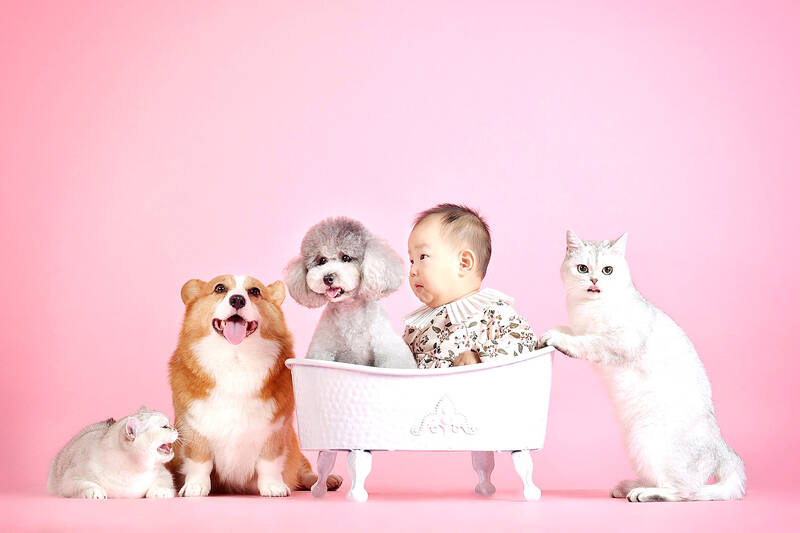對話 Dialogue
清清:華華,這是你的狗狗和貓貓嗎?好可愛喔!
Qīngqing: Huáhua, zhè shì nǐde gǒugou hàn māomao ma? Hǎo kě’ài o!

Photo: Pixabay / 照片:Pixabay 提供
華華:對啊!狗狗叫汪汪,貓貓叫喵喵,也是我的家人。
Huáhua: Duì a! Gǒugou jiào Wāngwāng, māomao jiào Miāomiāo, yě shì wǒde jiā rén.
清清:現在把寵物當成家人的人越來越多了,而且不只是貓狗,還有很多不同種類的生物呢!
Qīngqing: Xiànzài bǎ chǒngwù dāngchéng jiārén de rén yuèláiyuè duō le, érqiě bù zhǐshì māogǒu, háiyǒu hěnduō bùtóng zhǒnglèi de shēngwù ne!
華華:我小時候養過兔子跟天竺鼠,但那時候就是好玩,沒什麼感情。
Huáhua: Wǒ xiǎoshíhòu yǎng guò tùzi gēn Tiānzhú shǔ, dàn nà shíhòu jiù shì hǎowán, méi shénme gǎnqíng.
清清:我有一個同學養了一隻烏龜,有時候就把烏龜放在書包裡,跟他一起來上課。
Qīngqing: Wǒ yǒu yí ge tóngxué yǎngle yì zhī wūguī, yǒu shíhòu jiù bǎ wūguī fàng zài shūbāo lǐ, gēn tā yìqǐ lái shàngkè.
華華:真有意思!不過我聽過最特別的是養蛇和蜥蜴當寵物,這我完全不能接受。
Huáhua: Zhēn yǒu yìsi! Búguò wǒ tīngguò zuì tèbié de shì yǎng shé hàn xīyì dāng chǒngwù, zhè wǒ wánquán bùnéng jiēshòu.
清清:哇!也太酷了吧!真有勇氣!我可不敢跟蛇和蜥蜴當室友,你想試試看嗎?
Qīngqing: Wā! Yě tài kù le ba! Zhēn yǒu yǒngqì! Wǒ kě bùgǎn gēn shé hàn xīyì dāng shìyǒu, nǐ xiǎng shìshì kàn ma?
華華:別鬧了,我養好自己就好了,謝謝你喔!
Huáhua: Bié nào le, wǒ yǎnghǎo zìjǐ jiù hǎole, xièxie nǐ o!
翻譯 Translation
Qingqing: Hua Hua, is this your dog and cat? They are so cute.
Hua Hua: Yes. The dog is called Wangwang, and the cat is called Miaomiao. They are also my family.
Qingqing: Nowadays, more and more people treat their pets as family members, and it’s not just cats and dogs; there are many different kinds of living creatures.
Hua Hua: When I was little, I raised rabbits and guinea pigs, but back then it was just for fun, and I didn’t have
any emotional connection with them.
Qingqing: I have a classmate who has a turtle. Sometimes he puts the turtle in his backpack and brings it to class.
Hua Hua: That’s really interesting. But the most interesting thing I’ve heard of is keeping snakes and lizards as pets; I don’t get that at all.
Qingqing: Wow, that’s so cool. So brave. I wouldn’t dare to have snakes and lizards as roommates. Do you want to give it a try?
Hua Hua: Yeah, right. I’d rather take care of myself first, thank you.
生詞 Vocabulary
1. 養 (yǎng) raise, keep
2. 寵物 (chǒngwù) pet
3. 生物 (shēngwù) organism, creature
4. 兔子 (tùzi) rabbit
5. 天竺鼠 (Tiānzhú shǔ) guinea pig
6. 感情 (gǎnqíng) emotion, feeling
7. 烏龜 (wūguī) turtle, tortoise
8. 別鬧了 (bié nào le) [phrase] Stop joking, Stop messing around
教材音檔 Audio Files
國立清華大學華語中心提供
By National Tsing Hua University Chinese Language Center:

A: Recently, I’ve been seeing mosquitoes flying around in front of my eyes. The doctor said it’s the “flying-mosquito disease.” B: Flying mosquitoes? What a strange name. A: They’re actually called “floaters” in English, meaning floating debris. When fibrous substances in the vitreous body inside the eyeballs increase, floaters can appear in the visual field. B: Oh my goodness. Can you get rid of them? A: According to ophthalmologist Horng Chi-ting’s research, taking the enzymes of certain fruits is likely to help reduce floaters. A: 我最近一直覺得眼前有蚊子飛來飛去,結果醫生說是「飛蚊症」。 B: 飛蚊症?好奇怪的病名。 A: 英文名稱叫「floaters」, 也就是漂浮物的意思。 因為眼球的玻璃體中纖維化物質增多,導致視野出現漂浮物。 B: 天啊!要怎麼把蚊子趕走? A:

In Taiwan, people can use a platform to rent a power washer for a weekend or share unused garage space for someone’s storage needs. These are examples of the sharing economy, a consumption model that has gained widespread adoption worldwide. This approach allows people to rent or share assets like cars, homes or even services, typically through online platforms. This innovative model poses a simple yet powerful question: why purchase infrequently used items when sharing is more practical? By making useful but idle resources accessible, the sharing economy turns them into sustainable opportunities. Internationally, platforms like Airbnb and Uber have popularized

Bilingual Story is a fictionalized account. 雙語故事部分內容純屬虛構。 I stand by the Miluo River as dusk falls. The court betrayal is too much. I served Chu with loyalty. I forged alliances and fought corruption. But the whispers of jealous courtiers, the murmurs of treason, spoke louder. The king cast me out. The water looks calm. It promises peace. I step in. The river is cold against my legs. I hear shouts behind me — fishermen calling my name. I keep walking. The calls grow louder, but I do not turn around. The water rises to my chest. It pulls at me. I

A: What types of fruit enzymes should we take to help reduce eye floaters? B: According to a study published in the “Applied Sciences” journal by Taiwanese ophthalmologist Horng Chi-ting, pineapple, papaya and fig supplements can improve symptoms. A: Pineapples are in season now, so you should munch on more of those to get rid of floaters. B: Not quite. Enzymes can be damaged by our stomach acid if we eat the fruit directly. The doctor says taking fruit enzyme capsules is better for absorption. A: Most importantly, we should reduce our use of personal electronics to prevent floaters from